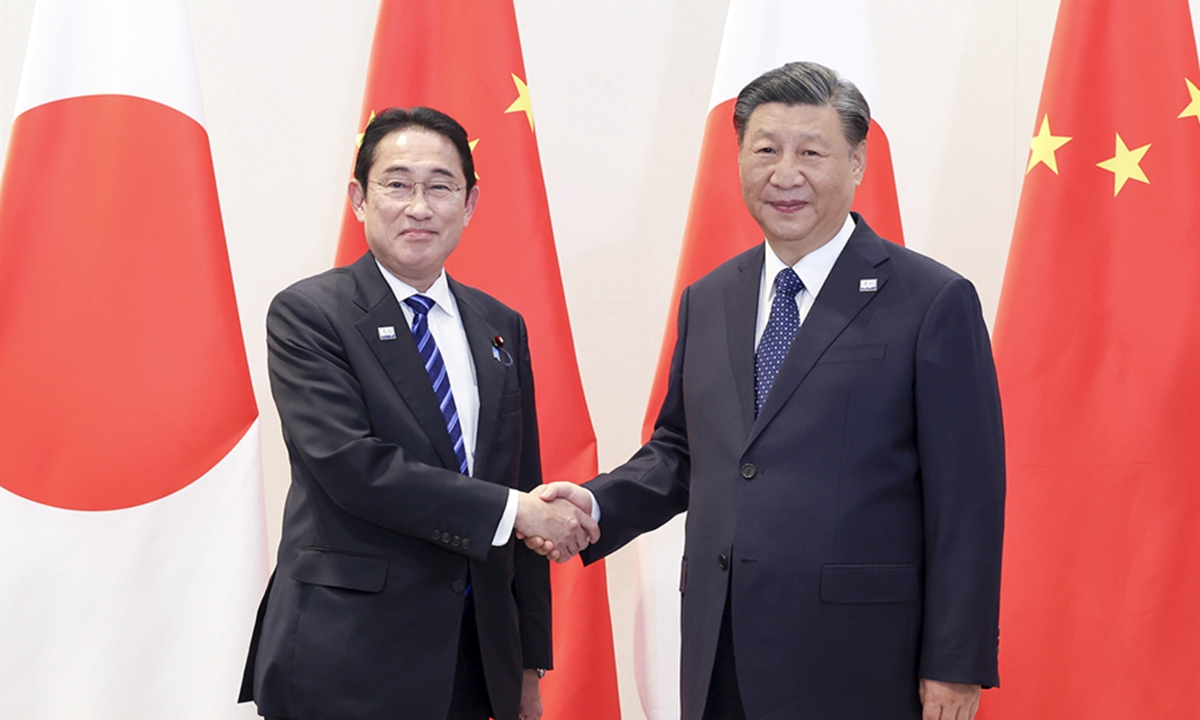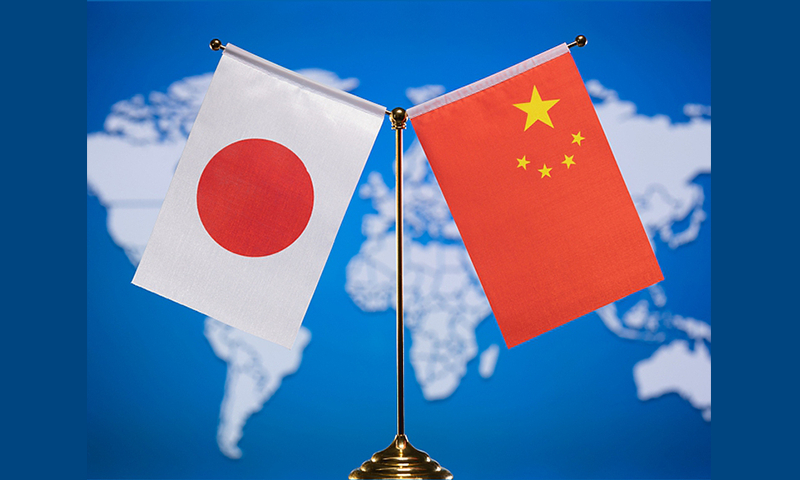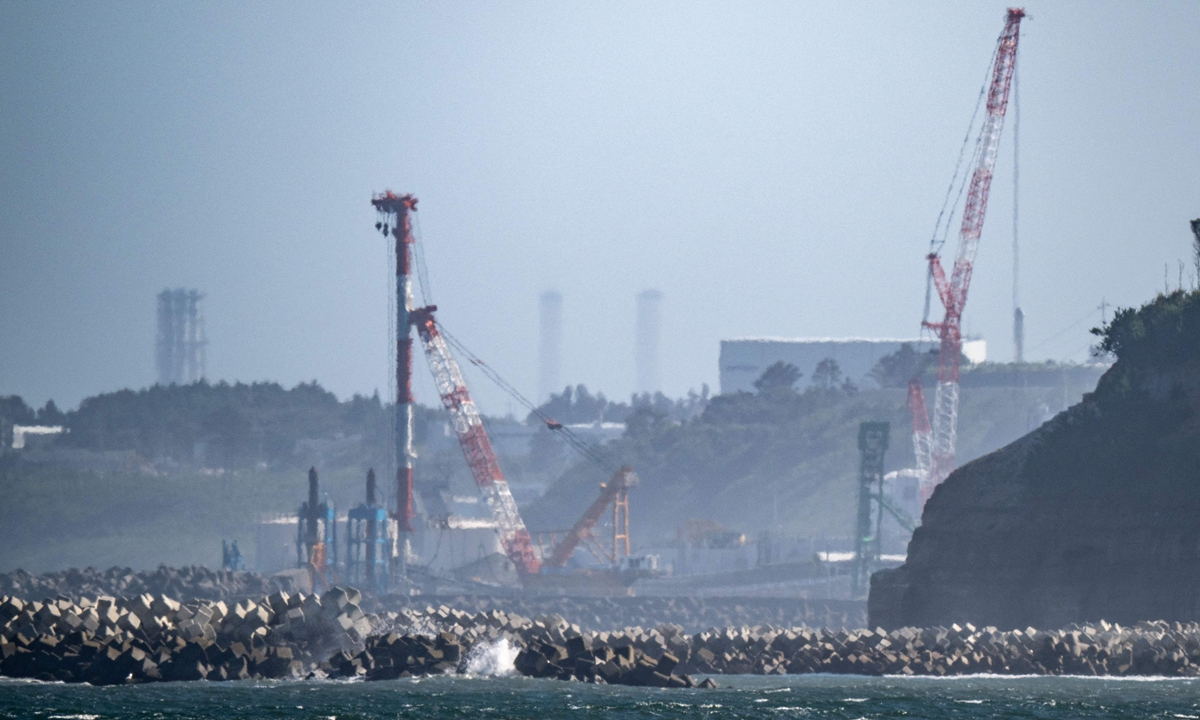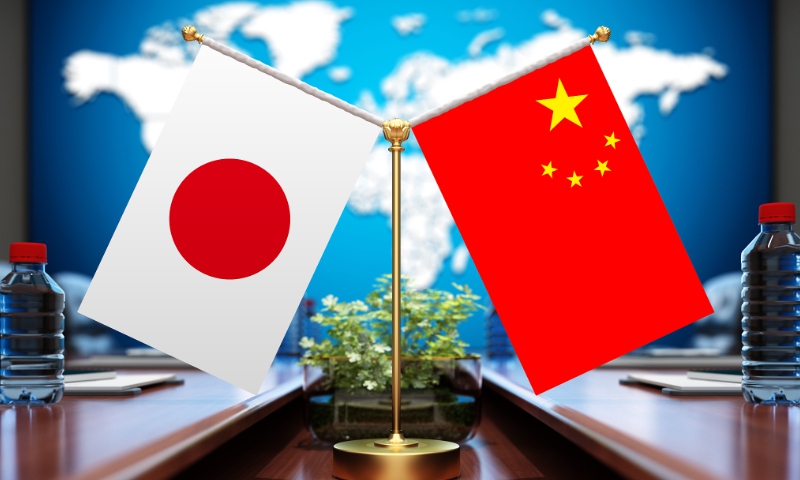Xi meets Kishida, reaffirming strategic and mutually beneficial relations
Meeting between Chinese and Japanese leaders plays significant role of stabilizing ties

Chinese President Xi Jinping meets Japanese Prime Minister Fumio Kishida in San Francisco on the sidelines of the APEC meetings on November 16, 2023. Photo: Xinhua
Chinese President Xi Jinping met Japanese Prime Minister Fumio Kishida in San Francisco on the sidelines of the APEC meetings on Thursday afternoon local time, reaffirming the position of comprehensively advancing the strategic and mutually beneficial relations between China and Japan and stressing that the foundation of bilateral relations should not be damaged or shaken, especially when it comes to major questions of principle related to history and Taiwan.
Both sides should focus on common interests, properly handle differences, and adhere to the principles set out in the four political documents between China and Japan, Xi said.
Some Chinese and Japanese experts indicated that in recent years, Japan's policy toward China has lost its strategic autonomy, reflecting a trend toward following the US, leading to the continuous accumulation of structural problems between China and Japan.
The more this situation persists, the more important it becomes to maintain high-level dialogue, and the latest meeting between the leaders of the two countries has played a significant role in stabilizing overall bilateral relations, they noted.
The meeting marks the first high-level dialogue between the leaders of the two countries since their last meeting approximately a year ago in Bangkok, Thailand, in November 2022.
At present, the international situation is intertwined with changes and chaos, and risks and challenges emerge one after another. Peaceful coexistence, enduring friendship, mutually beneficial cooperation, and common development are the right direction that serves the fundamental interests of the Chinese and Japanese peoples, Xi told Kishida.
Both sides should grasp the general trend of history, follow the trend of the times, focus on common interests, properly handle differences, and abide by the principles set out in the four political documents between China and Japan, Xi said.
Japanese media, Yomiuri Shimbun, reported that despite differences between Japan and China on security and the ban on Japanese seafood products, reaffirming the positioning of strategic and mutually beneficial relationship aims to continue dialogue and cooperation in areas such as economy and climate change, in order to ensure the interests of both sides.
"The concerns of China and Japan are very inconsistent, with Japan focusing on specific 'pending cases' such as the embargo on Japanese seafood products, while China is concerned about Japan's negative actions related to Taiwan, maritime issues, military security, as well as Japan's severely biased perception and strategic positioning toward China," said Xiang Haoyu, a research fellow at the China Institute of International Studies.
Against this backdrop, reaffirming the positioning of strategic and mutually beneficial relationship serves as a call for Japan to handle China-Japan relations from a strategic height and long-term perspective, sticking to the direction of mutually beneficial cooperation, Xiang said.
For isolated contentious issues, one should not lose sight of the bigger picture; it is essential for Japan to adapt to new situations, adjust biased strategic thinking toward China, and create conditions for resolving specific issues by enhancing political and security trust, the expert said.
The meeting between Xi and Kishida also reiterated the adherence to the principles set out in the four political documents between the two countries.
Xiang explained that the core of the spirit of the four political documents between China and Japan is, first, for Japan to properly handle major sensitive issues such as history and the Taiwan question, and second, for China and Japan to adhere to the relationship positioning of "mutual cooperation partners, not posing threats to each other."
Judging from Japan's policy toward China over recent years, there have been a series of negative actions that violate and trample on these core spirits, leading to a decline in China-Japan relations, experts said.
"We hope that the Japanese government will take two concrete actions: first, in terms of semiconductor export controls, Japan's restrictive measures are stricter than those of the US and can be relaxed; second, the diplomatic stance of the Kishida administration leans toward the US and should be adjusted to maintain a balanced diplomatic policy between China and the US," Kiyoyuki Seguchi, director of the Canon Institute for Global Studies in Japan, told the Global Times.
Xi told Kishida during the meeting on Thursday that the economic interests of China and Japan, as well as their industrial and supply chains are deeply intertwined, and it is in no one's interest to engage in "small yard, high fence" and "decoupling and breaking chains."
On Wednesday local time, the China-US summit was held at the Filoli estate in San Francisco. Some analysts suggest that Japan's policy toward China has traditionally closely followed the pace of the US. If there are signs of improvement in the China-US relations, Japan may adjust its stance accordingly.
Kamo Tomoki, a professor from the Faculty of Policy Management at Keio University, told the Global Times that the strategic approach of the US toward China has not fundamentally changed, and Japan is likely to follow suit.
Whether discussing the current China-US relations or China-Japan relations, the notion of "reaching a turning point" is still premature, he said.
The ongoing accumulation of issues between Japan and China could lead to a prolonged period of a "cooling" state. In such a situation, there is a greater need to actively promote dialogue and mutual visits between the top leadership of both countries, the expert said.
The significance and impact of the bilateral meetings during the APEC summit are markedly different for China-US relations and China-Japan relations. The China-US summit, following extensive preparations and a series of high-level interactions over the past few months, has achieved important consensus and outcomes, holding significant implications for global strategic stability, Xiang said.
"In contrast, Japan's recent policy toward China has lost its strategic autonomy, increasingly demonstrating characteristics of following the US and being subordinate to China-US relations. Japan's seeking of a bilateral meeting with China is to a large extent a response to the current situation, fearing being 'overstepped' by the US again," Xiang said.
The root cause of the difficulties in China-Japan relations lies in Japan's distorted perception and the biased policy orientation toward China in recent years, the expert said.
The primary role of this China-Japan bilateral meeting is to stabilize the overall China-Japan relationship and prevent the further deterioration of bilateral ties, Xiang said.
During the meeting on Thursday, Xi also told Kishida that the discharge of nuclear-contaminated water from the Fukushima power plant into the sea by Japan is a matter concerning the health of all humanity, the global marine environment and international public interests, and Japan should earnestly address the legitimate concerns at home and abroad, and handle the situation in a responsible and constructive manner.
Both parties agreed to find an appropriate solution to the issue with a constructive attitude through consultations and negotiations.
Kishida said the Japanese side hopes to look toward the future, strengthen high-level communication and dialogue with China, increase the positive factors in bilateral relations, and adhere to peaceful coexistence. Japan has no intention of "decoupling or cutting off ties" with China, he said.
The Japanese leader also said that Japan will continue to commit to the path of peaceful development, and its stance on addressing the Taiwan question in accordance with the Joint Communique of Japan and China remains unchanged.
Xiang told the Global Times that fundamentally, the current difficulties in China-Japan relations stem mainly from Japan's anxiety about China's growing influence, and its restless feeling about being left out of its own status as a major power.
This requires Japan to actively adapt to changes in the situation, timely adjust its self-perception and its strategic orientation toward China. However, at present, it seems that Japan is not mentally prepared for this development, and it has not actively made relevant adjustments. On the contrary, it seeks to rely on other countries to curb China's development, which is Japan's strategic neglect and serious misjudgment, Xiang said.
"Of course, it is difficult to expect Japan to quickly adjust its strategic direction in the current context of the continuous right-leaning and conservative trend in Japanese domestic politics. For bilateral disputes between China and Japan, the most urgent task is to strengthen strategic communication, expand dialogues and exchanges in various fields and at all levels, accelerate the re-adjustment of mutual understanding and positioning, and confirm the 'bottom line' and 'barriers' in China-Japan relations, especially reaching new consensus on questions related to Taiwan and the sea, to ensure the overall stability of China-Japan relations," Xiang added.





